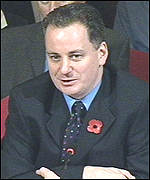Jack McConnell

|
This article is part of the Revolving Door project of Spinwatch. |
Jack McConnell (Lord McConnell of Glenscorrodale) is a Labour peer in the House of Lords, having joined on the 28 June 2010.[1]
He was the First Minister of Scotland from 2001 to 2007.
Background
McConnell's roles have included Member of Scottish Parliament for Motherwell and Wishaw (1999-2001), Scotland's Minister of Finance (1999-2000) and Scotland's Minister for Education, Europe and External Affairs (2000-2001).
In 2001 he was elected the third First Minister in the devolved Scotland. There is a 'widespread view of [McConnell] as a 'machine politician'.[2] This is often explained in terms of his history as part of the Labour 'Lanarkshire mafia'.[3][4]
Lobbygate
McConnell was centrally involved in the first lobbying scandal of the Scottish Parliament known as 'Lobbygate'. A former General Secretary of the Labour Party in Scotland, McConnell was recruited to a lobbying firm which was a joint venture between Beattie Media and Scottish law firm Maclay Murray & Spens, called Public Affairs Europe Ltd.[5]
- Jack McConnell, a Labour Holyrood hopeful, has also become involved in the "cronyism" row but said he did not see a conflict of interest in his move from general secretary of the Scottish Labour Party to a lobby company, Public Affairs Europe. He said his new employer advised on the political climate and did not arrange meetings with ministers.[6]
Pro-Nuke
McConnell has launched an internal Labour party consultation on whether new nuclear power stations can be built in Scotland, but it is widely predicted that if Blair gives the green light for nuclear, Scotland's Labour party will follow suit.
Scotland's First Minister is said to be "paving the way for a Scottish Labour U-turn which would remove its opposition to new nuclear power stations being built in Scotland."[7]
Wishawgate
This was the scandal over the £11,000 hole in the Accounts for McConnell's constituency party in the West of Scotland town of Wishaw.
In the view of Kenny Farquharson of the Sunday Times:
- Wishawgate has taken us deeper than ever into the labyrinth of score-settling, jealousy and personal animus that is the Scottish Labour party. It has also taken us down seldom trod alleys of McConnell's life, revealing the true nature of the sometimes shady political world in which he operates. Wishawgate is not the end of McConnell's career. It may not even be the beginning of the end. But it will hang around the first minister's neck for the foreseeable future and its unpleasant smell could prove hard to dispel.[8]
Interests
- Non-executive Director, DCM (Optical Holdings) Ltd (dispensing opticians)
- Member, Advisory Board, PricewaterhouseCoopers
- Chair, Community Fund Panel of Scottish and Southern Energy plc
- Professorial Fellow, University of Stirling, Scotland
- Visiting lecturer, Dubrovnik International University, Croatia
- Consultant, 2CV, Global Research Consultancy, UK[1]
Resources
David Miller 'Corporate power, institutional corruption:endemic lobbying means corporations control too much of Scotland' Spinwatch, September/October 2003.
References
- ↑ 1.0 1.1 Lord McConnell of Glenscorrodale Parliament.UK, accessed 22 December 2014
- ↑ William Dinan 'Open Scotland's Executive' Spinwatch, 21 October 2002.
- ↑ Kenny Farquharson, 'The Scent of a Rose May Prove Less Sweet', Sunday Times December 29, 2002, not available online.
- ↑ Iain Macwhirter, 'After centuries of council cronyism, Holyrood has to finally blow the lid off sleaze Analysis: The Third Age affair goes much deeper than Henry McLeish and Officegate. It has its roots in a loathsome part of Scottish political and economic life', Sunday Herald, March 10, 2002.
- ↑ Philip Schlesinger, David Miller and Will Dinan Open Scotland, Journalists, Spin Doctors and Lobbyists, Edinburgh: Polygon 2001.
- ↑ The Scotsman July 9, 1998, Thursday LEADING LABOUR HOPEFUL LEAVES JOB AT LOBBY FIRM BYLINE: David Scott SECTION: Pg. 4
- ↑ Paul Hutcheon, "First Minister Asks Scottish Labour to Consider New Nuclear Power Stations", Sunday Herald, January 15, 2006
- ↑ Kenny Farquharson, 'The Scent of a Rose May Prove Less Sweet', Sunday Times December 29, 2002, not available online.
